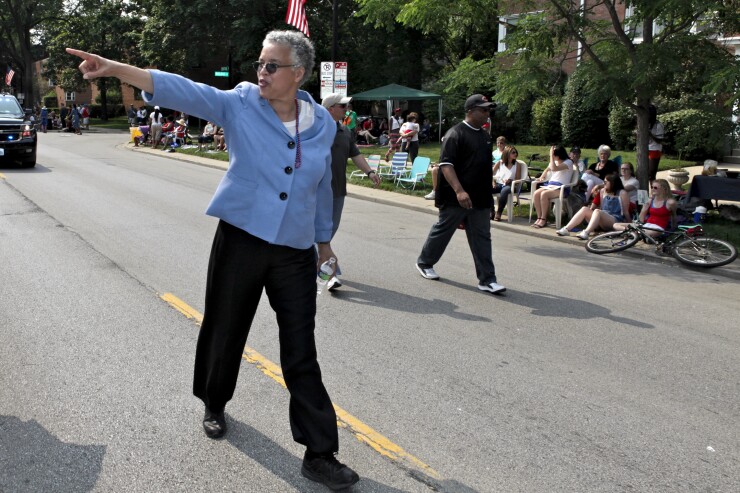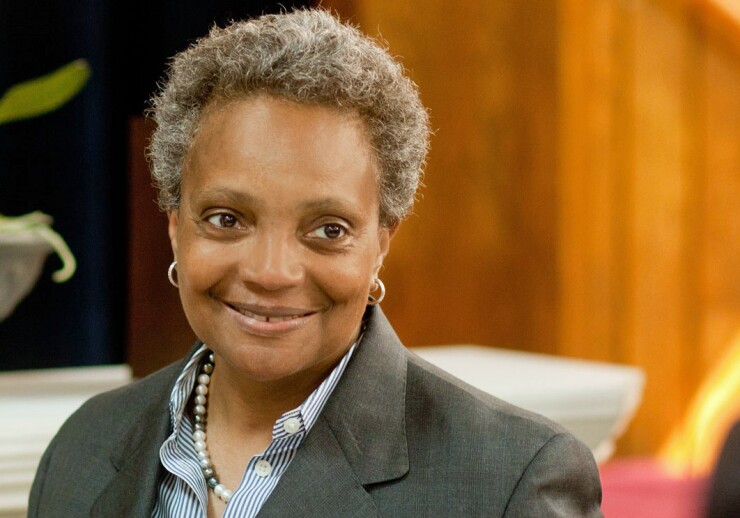CHICAGO — Market unease over Chicago’s looming leadership change will require more investor legwork and hand-holding as the city prepares to offer its first general obligation paper in two years, says chief financial officer Carole Brown.
The City Council is expected to approve the up to $850 million borrowing authorization at its meeting Wednesday following its vetting by the Finance Committee Monday. The sale is expected late this month or early next depending on various market factors including the timing of the state’s upcoming GO sale.

Voters will choose between lawyer Lori Lightfoot and Cook County Board President Toni Preckwinkle in an April 2 mayoral runoff. Chicago Mayor Rahm Emanuel announced in September he would not seek a third term, surprising the market that has grown fond of him and his CFO for fiscal gains led by the passage of higher taxes to stave off the pension system’s insolvency.
“I think we will have to probably do more investor education" to put the city’s fiscal profile in the context of the changing administration, Brown said after the meeting, because the uncertainty makes the market a little nervous. “They like certainty,” she said.
"We are going to have to have a discussion with them and let them know what framework we are leaving in place for the next administration because there's some big questions that the next administration is going to have to address when it comes to the finances,” she added. “We are going to market this transaction aggressively," she said, based on the city’s improved financials.
The most pressing concern is dealing with $28 billion of unfunded pension liabilities that will require a $280 million payment spike for public safety contributions next year and then another $310 million two years later.
If approved Wednesday, the city will distribute a preliminary offering statement Friday and then begin investor outreach. The city will provide updates to Fitch Ratings, Kroll Bond Rating Agency, and S&P Global Ratings. It does not seek ratings from Moody’s Investors Service which rates the city at junk-level Ba1.
Fitch Ratings has the city at BBB-minus with a stable outlook. S&P Global Ratings rates the city at BBB-plus and stable. Kroll Bond Rating Agency rates the city A with a stable outlook.
Barclays will run the books on the new money deal that will finance 2018 and 2019 capital projects with a portion paying off commercial paper that provided interim financing.
The city’s financial landscape has brightened compared to its last GO deal in January 2017 with progress on pension funding, its budget deficit, one rating upgrade, and stable rating outlooks. Chicago Public Schools is also now on more stable fiscal footing and the city is likely to enjoy a more friendly relationship with the new Democratic governor, J.B. Pritzker, after a combative one with his predecessor, Republican Bruce Rauner.
“They do have a lot of tailwinds behind them, and given the current situation the credit is in a more stable place than two years ago,” said Dennis Derby, senior research analyst at Wells Capital Management Inc. and portfolio manager for the Wells Fargo High Yield Municipal Bond Fund, but it’s “hard to tell” what cost investors will demand for the uncertainty going forward.
SALES PITCH
Brown insists that some policy and funding measures in place will be difficult to reverse by the next mayor.
“We can say the requirement to fund pensions is a statutory requirement. We can say that we've de-risked the balance sheet. We ended some of the bad financial practices we inherited so that the ability to fall back” on those fronts “is difficult,” Brown said.
“We can say we improved our unassigned fund balance and we've improved our liquidity,” Brown continued. “We can say through a successful STSC [Sales Tax Securitization Corp.] we've saved the city over a billion dollars and so we are back to an improving financial picture and we believe the next administration will want to continue that."
Brown is referencing the city’s pension funding overhaul that is part of state pension law now and requires the city to ramp up funding to actuarial levels in the coming years, the city’s shedding of swaps and general obligation floating-rate debt, ending the use of reserves, and phasing out scoop-and-toss debt restructuring for budget relief.
The city’s fund balance is up to about $150 million from low double digit levels and the structural imbalance was trimmed to under $100 million this year from the more than $600 million Emanuel inherited. The city established the higher rated sales tax securitization structure to refund general obligation bonds at lower rates.
Still, clouds loom.
In addition to the pension funding needs, a budget gap of $250 million is projected next year, debt service will rise, and police and fire labor contracts must be tackled when the new administration takes office May 20. S&P warned in a recent report it could “take a negative rating action” if the city backslides on its progress toward structural alignment on full actuarial pension funding.
Brown acknowledged her assurances may only go so far with investors.
“The market is going to want to know that there is a commitment from the next administration to do what needs to be done including having the revenue to support the operations,” Brown said.
Most of gains ticked off by Brown weren’t accomplished until Emanuel’s second term, but the payoff has come in a material narrowing of the city’s spreads since the last sale.
A 2037 maturity traded at 145 basis points over the triple-A benchmark on March 1 and March 8, said IHS Markit strategist Ed Lee.
The city’s primary spreads peaked with the $1.1 billion 2017 issue.
The 2038 tax-exempt term bond paid a yield of 6.20%, 323 bps more than the Municipal Market Data’s triple-A benchmark while 2029 serial bond paid a yield of 5.8%, 331 bps over MMD.

A taxable 2042 bond traded at 342 bp and 347 bp spreads to Treasurys, IHS said in its Monday market report. That’s wider than last week but far narrower than the 2017’s 2029 term bond that paid priced at a 457.8 bp spread.
NEAR THE END
The city has water and wastewater deals to sell but they have refunding components that are market-driven and the city may run out of time to sell them before Emanuel’s exit.
Brown has long made it known in public finance circles that after four years in the post, she was ready to move on, whether the mayor ran again or not. She declined to discuss her future after May 20.
“Right now my intention is to stay and support the mayor,” she said.
The mayor’s proposed $10 billion
Several aldermen said that’s unlikely given Emanuel’s other development priorities that will require political capital.
"I don't believe it's dead,” Brown said of the deal. “The market has shifted so the economics are different” and the council and next administration will need to address high contribution requirements.
Neither candidate has embraced the idea, with Preckwinkle saying she would first look to other revenue sources while Lightfoot expressed concern about saddling the city with more debt. Those positions could change.

The sales tax securitization bonds and the possible issuance of POBs using a similar structure may be a drag on the city’s future, Municipal Market Analytics wrote in a recent weekly outlook piece that offered a critical assessment of the Sales Tax Securitization Corp. program.
“Chicago’s debt issuance through its STSC reduces the burden on near-in budgets and today’s taxpayer by shifting significant costs to the next generation. The weighted average maturity of the new debt — at nearly 20 years — is estimated to almost double that of the refunded bonds,” MMA wrote.
About one-third of the $2.64 billion of refunding bonds issued comes due between 2043 and 2048. The original bonds were to have been paid off by 2043 and payout is “extraordinarily slow,” MMA wrote.
“Instead of using the highly rated STSC financing vehicle for lowering costs throughout the existing maturity structure or paying off longer-dated debt, the transactions traded in much of the potential savings in return for significantly lowering principal payments over the short to medium term,” MMA wrote. “A longer, higher debt burden increases the city’s credit and rating vulnerability to economic backsliding and/or disappointing organic revenue growth in the long term.”
Brown has defended the repayment structure as the best means to balance the benefits of lowering GO debt service costs with the need to limit how much annual sales tax revenue is diverted from the budget.
The upcoming deal’s team includes a 55% level of participation by minority, women and veterans-owned firms. Barclays has the books and another six firms round out the team. Swap Financial Group and Columbia Capital Management LLC are advisors. Bond counsel is Miller Canfield Paddock and Stone is bond counsel, Zuber Lawler & Del Duca LLP is co-bond counsel, Cotillas & Associates is disclosure counsel, and Chapman and Cutler LLP is pension counsel.





